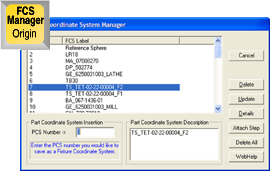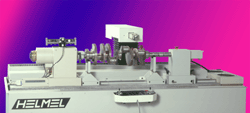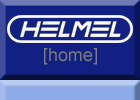| A measured dimension is erroneous or
meaningless if it is not properly tied to a
valid Part Coordinate System (PCS). Geomet
therefore historically has and still does
put great emphasis on the correct and
efficient establishment of a PCS. This is
one of Geomet's great strengths when
measuring prismatic parts.
 Highly
flexible PCS formation tools allow easy
establishment of datum frames for parts in
any position on the machine. Basic PCS set
up commands consist of ORIENT, ALIGN and
ORIGIN for the construction of Primary,
Secondary and Tertiary datums. A handy PCS
Setup Guide serves as a visual reminder of
any missing steps in the construction of a
PCS. Multiple PCSs can be created during an
inspection operation and the operator is
free to move in and out of any PCS at any
time. As PCSs are created, they are
automatically saved. A 3D icon in the
graphics area indicates the location and
orientation of the currently active PCS as a
visual reference. Highly
flexible PCS formation tools allow easy
establishment of datum frames for parts in
any position on the machine. Basic PCS set
up commands consist of ORIENT, ALIGN and
ORIGIN for the construction of Primary,
Secondary and Tertiary datums. A handy PCS
Setup Guide serves as a visual reminder of
any missing steps in the construction of a
PCS. Multiple PCSs can be created during an
inspection operation and the operator is
free to move in and out of any PCS at any
time. As PCSs are created, they are
automatically saved. A 3D icon in the
graphics area indicates the location and
orientation of the currently active PCS as a
visual reference.
PCSs can be translated in any or all axes to
create new PCSs. They can also be rotated
around any axis. Features measured in one
PCS will automatically be projected
correctly into a new PCS if recalled in one.
The elements of PCSs (for example, an
origin, a datum axis or a datum plane) can
be extracted for use in other constructions
or PCSs. Up to 500 PCSs can be created and
recalled.
One important proprietary feature of Geomet
is the Intermediate Coordinate System, ICS
to PCS command. If for instance a night
shift operator wants to quickly check a bore
for size, he just sets the part on the
table. By pushing the ICS/PCS key the
machine coordinates become part coordinates
and his diameter measurement will be correct.
 Pre-established
and stored Fixture Coordinate Systems (FCS)
are handy, timesaving tools in the
repetitive inspection of production parts
that are fixtured. FCS eliminates the manual
PCS formation procedure to locate the part
or parts for each run. Unlimited FCSs enable
you to check many or different parts in a
run. Pre-established
and stored Fixture Coordinate Systems (FCS)
are handy, timesaving tools in the
repetitive inspection of production parts
that are fixtured. FCS eliminates the manual
PCS formation procedure to locate the part
or parts for each run. Unlimited FCSs enable
you to check many or different parts in a
run.
 Geomet has fourth axis capability, referred
to as a Wobble Coordinate System (WCS),
permitting the use of Rotary Tables. The
software compensates for table runout.
Another Typical application for a WCS is in
Helmel's
automatic shaft and crankshaft CMMs
with Horizontal Rotary Axis. Geomet has fourth axis capability, referred
to as a Wobble Coordinate System (WCS),
permitting the use of Rotary Tables. The
software compensates for table runout.
Another Typical application for a WCS is in
Helmel's
automatic shaft and crankshaft CMMs
with Horizontal Rotary Axis. |






